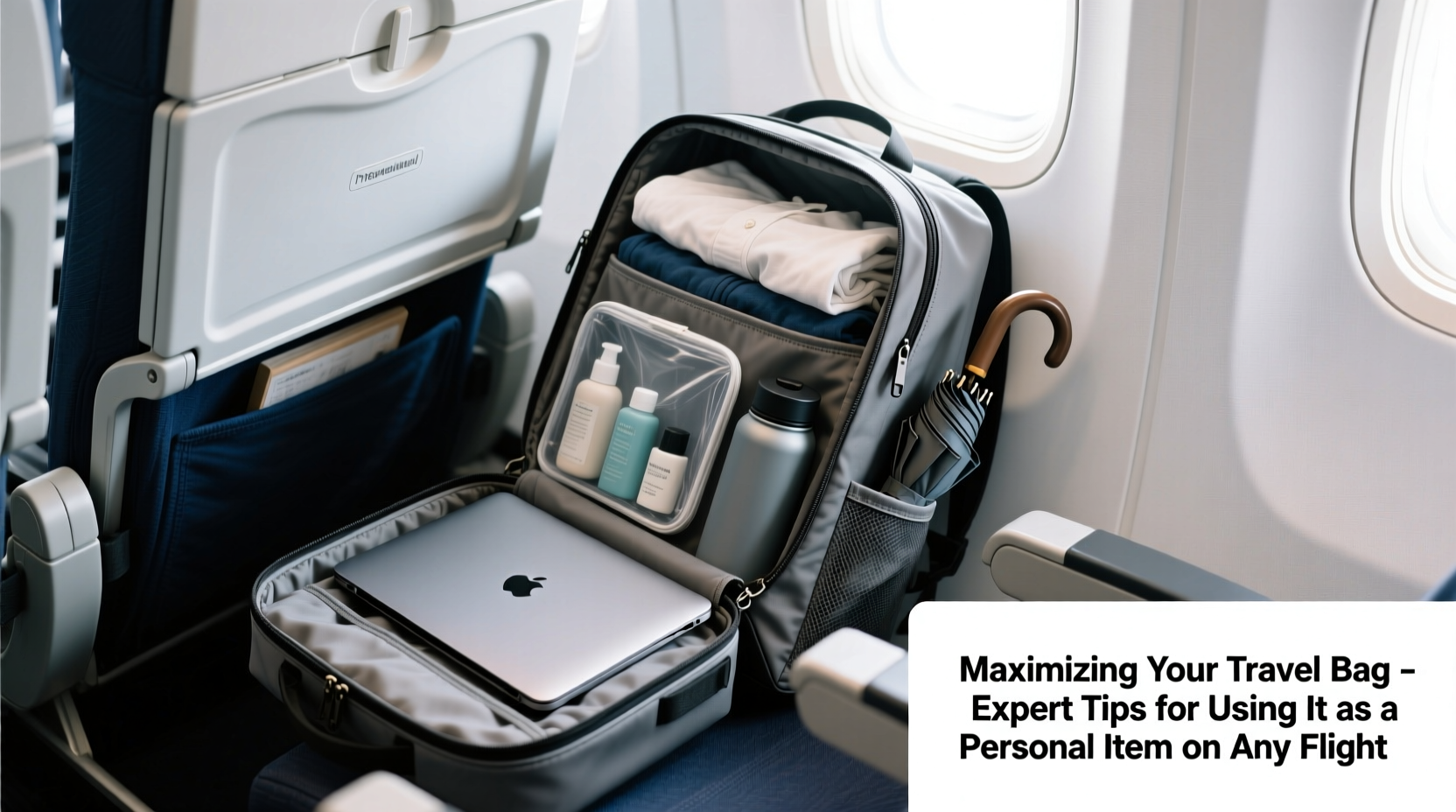Traveling light doesn’t mean sacrificing convenience. In fact, mastering the use of your travel bag as a personal item can streamline your journey from curb to gate. With airlines tightening carry-on policies and boarding efficiency becoming a priority, understanding how to optimize your personal bag is no longer optional—it’s essential. This guide delivers actionable insights, real-world examples, and expert-backed strategies to ensure your bag works for you, not against you.
Understanding Airline Personal Item Policies

Every airline defines \"personal item\" differently, but most agree it should fit under the seat in front of you. While carry-ons go overhead, personal items stay within reach—making them ideal for valuables, electronics, and essentials. However, dimensions vary significantly between carriers.
| Airline | Max Dimensions (Inches) | Notes |
|---|---|---|
| Delta | 18 x 14 x 8 | Must fit under seat; laptop bags count if within size |
| United | 17 x 10 x 9 | Strict enforcement during peak travel |
| American Airlines | 18 x 14 x 8 | Larger than United but same footprint |
| Southwest | 13.5 x 8.5 x 9 | Tightest limit among major U.S. carriers |
| JetBlue | 17 x 12 x 9 | Measured at gate if space is limited |
Always verify the current policy before flying. A bag that qualifies on one airline may be rejected on another, leading to last-minute repacking or fees.
Choosing the Right Bag for the Role
Not every bag is suited to serve as a personal item. The ideal choice balances capacity, comfort, and compliance. Look for these features:
- Under-seat compatibility: Measure your bag against airline limits and test it under a chair at home.
- Dedicated tech pockets: Keeps devices organized and easily accessible during security checks.
- Expandable design: Allows flexibility when carrying souvenirs on return flights.
- Comfortable straps: Padded shoulder straps or trolley sleeve make transitions smoother.
- Water-resistant material: Protects contents from spills or weather exposure in crowded terminals.
“Your personal item should function like a mobile command center—not just storage.” — Marcus Tran, Travel Gear Designer at AeroPack Labs
Backpacks often outperform tote bags due to weight distribution and ease of access. However, professionals may prefer slim briefcases that project polish without sacrificing utility.
Smart Packing: What Goes in Your Personal Item?
The goal isn't to pack more—it's to pack smarter. Prioritize items that enhance comfort, security, and productivity during transit.
Essential Do’s & Don’ts
| Do Include | Avoid Storing Here |
|---|---|
| Passport, ID, boarding pass holder | Heavy books or binders |
| Phone, charger, power bank (under 100Wh) | Full-size toiletries (risk of leaks) |
| Medications and medical devices | Checked baggage-only items (e.g., lithium batteries over limit) |
| Earbuds, noise-canceling headphones | Alcohol purchased airside (if crossing international borders) |
| Light snack and reusable water bottle (empty through TSA) | Sharp objects (even small knives prohibited) |
Keep high-value electronics close. Laptops, tablets, and cameras are safer within arm’s reach than buried in an overhead bin vulnerable to tampering or accidental damage.
Step-by-Step: Optimizing Your Bag Before Flight
Follow this sequence to ensure your personal item performs flawlessly throughout your trip:
- One week before departure: Lay out all potential items and assess necessity. Remove duplicates or low-priority objects.
- Three days prior: Charge all devices and test cables. Label cords with tags to avoid confusion.
- Night before: Pack non-liquid essentials. Place documents in a clear sleeve for quick access.
- Morning of travel: Add medications, snacks, and wearable layers (scarf, jacket).
- At security: Remove large electronics and liquids into a separate bin. Keep the bag open for efficient screening.
- Onboard: Slide the bag fully under the seat ahead. Avoid partial blocking of the aisle.
Real-World Example: Surviving a Tight Connection
Sophia, a digital nomad based in Austin, once had a 42-minute layover in Chicago O’Hare while traveling to London. Her checked bag was routed separately, and delays pushed her first flight late. She relied entirely on her personal backpack.
Inside, she carried her passport, a collapsible water bottle, protein bars, noise-canceling headphones, and a compact change of clothes in case of luggage loss. Because everything was organized and compliant, she cleared re-screening quickly, navigated to her next gate via the fastest route, and boarded with two minutes to spare.
“If I’d stashed my headphones or snacks in my carry-on,” she said later, “I’d have missed that flight. My personal bag saved me.”
Frequently Asked Questions
Can I bring both a backpack and a purse as personal items?
No. Most airlines allow only one personal item in addition to a carry-on. Combining a backpack and handbag may prompt gate agents to require one to be checked.
Does a laptop bag count as a personal item?
Yes—if it fits under the seat and is carried in addition to a larger carry-on. However, if it’s your only bag, it counts as your carry-on, not a personal item.
What happens if my personal item is too big?
You may be asked to check it at the gate, often for a fee ($25–$35). To avoid delays, measure your bag beforehand and consider downsizing.
Final Checklist: Is Your Bag Ready?
- ✅ Meets airline size limits?
- Double-check dimensions specific to your carrier.
- ✅ Fits under a standard airline seat?
- Test it under a dining chair at home.
- ✅ Contains only TSA-compliant liquids?
- All containers must be 3.4 oz (100ml) or less, in a quart-sized bag.
- ✅ Organized for fast access?
- Documents, electronics, and meds should be top-accessible.
- ✅ Weight balanced for comfort?
- Aim for under 15 lbs to prevent strain during long walks.
Conclusion: Turn Your Bag Into a Travel Advantage
Your personal item is more than just extra storage—it’s a strategic tool for smoother travel. When thoughtfully selected and efficiently packed, it reduces stress, protects valuables, and keeps you agile in unpredictable situations. Whether you're a frequent flyer or preparing for a single annual getaway, investing time in optimizing this small bag yields outsized returns.









 浙公网安备
33010002000092号
浙公网安备
33010002000092号 浙B2-20120091-4
浙B2-20120091-4
Comments
No comments yet. Why don't you start the discussion?